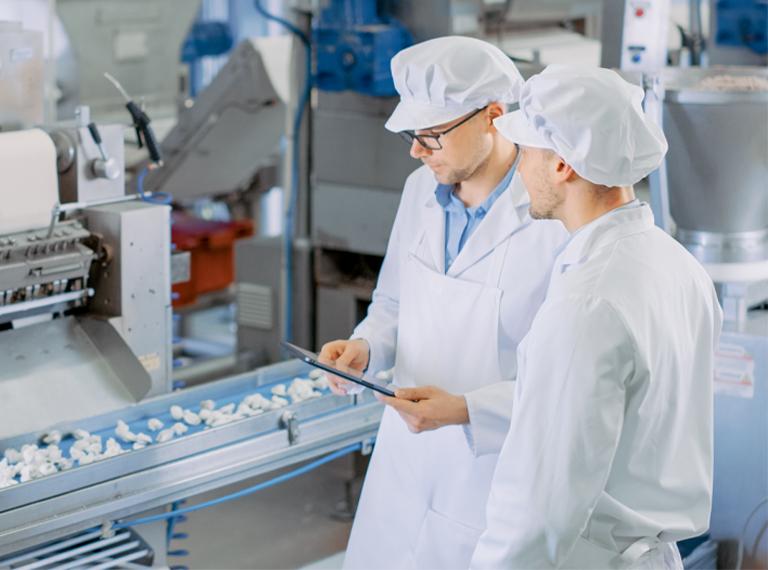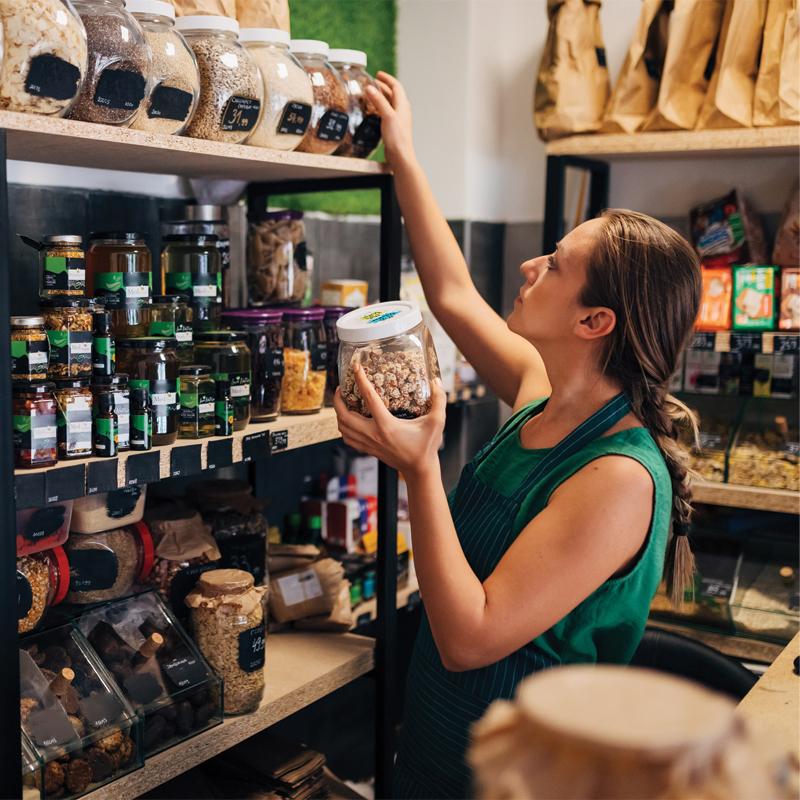Passionate about food production? Use our guide to discover what's involved in becoming a food production manager and how to build your career in this exciting sector.
What is a food and FMCG production manager?
A production manager role in the food and FMCG (fast-moving consumer goods) industry oversees the manufacturing process, ensuring products are produced efficiently, safely, and to a high standard. Their responsibilities include coordinating production schedules, managing staff, implementing health and safety procedures, monitoring equipment maintenance, and optimising production processes to meet targets and deadlines. They also liaise with other departments such as procurement, quality assurance, and logistics to ensure smooth operations throughout the supply chain.
The production manager role is best suited to individuals with strong leadership skills, excellent problem-solving abilities, and a thorough understanding of manufacturing processes. Attention to detail is crucial, as production managers must ensure compliance with regulatory standards and quality control measures. Effective communication skills are also essential for coordinating teams and collaborating with various stakeholders.
Adaptability is an asset in this dynamic industry, as production managers must be able to respond quickly to changes in demand, supply chain disruptions, and technological advancements.
Employers in the food and FMCG sector seek out individuals with a blend of technical expertise, managerial acumen, and a passion for driving operational excellence.
Types of production manager in food and FMCG
In the food and FMCG industry, production manager responsibilities can vary depending on the specific company and product. However, some common types of production manager roles include:
Food production manager: responsible for the production process in food manufacturing facilities, ensuring that products meet quality standards, safety regulations, and production targets.
Operations manager: manages overall operations within a manufacturing facility, including production, inventory management, and quality control.
Supply chain manager: oversees the supply chain process, including sourcing raw materials, production scheduling, and distribution logistics to ensure efficient and timely delivery of products.
Quality assurance manager: ensures that products meet quality standards and regulatory requirements by implementing quality control procedures, conducting audits, and managing quality assurance teams.
Continuous improvement manager: focuses on improving production processes, reducing waste, increasing efficiency, and implementing lean manufacturing principles to optimise operations.
Shift production manager: manages production activities during specific shifts, ensuring that production targets are met, and addressing any issues that arise during operations.
Packaging manager: looks after the packaging process, including design, procurement, and implementation of packaging materials and equipment to ensure products are packaged efficiently and meet customer requirements.
Safety manager: implement safety protocols and procedures to ensure a safe working environment for employees and compliance with health and safety regulations.
Maintenance manager: manages maintenance activities for production equipment and facilities to minimise downtime, maximise equipment reliability, and ensure smooth production operations.
Engineering manager: manages engineering projects related to production processes, equipment upgrades, and facility improvements to enhance productivity and efficiency.
These roles may overlap or be combined depending on the size and structure of the organisation. Additionally, specific job titles and responsibilities may vary between companies.
What do you need to become a production manager in food and FMCG?
To become a production manager in the UK food and FMCG industry, typically you would need:
Education
A bachelor’s degree in a relevant field such as food science, engineering, business administration, or industrial management is often required. Some employers may prefer candidates with a master's degree or relevant professional qualifications.
Experience
In manufacturing or production roles within the food or FMCG industry, experience is highly valued. This might include working in roles such as production supervisor, quality control, or process engineering.
Skills
Successful production managers in the food and FMCG sector will need a combination of the following skills:
Technical skills: proficiency in production processes, quality control measures, and health and safety regulations specific to the food and FMCG industry is essential. Knowledge of manufacturing technologies, such as lean manufacturing or Six Sigma, can also be beneficial.
Managerial skills: strong leadership, communication, and problem-solving skills are crucial for managing production teams effectively. Experience in managing budgets, setting production targets, and optimising workflows is also important.
Regulatory knowledge: understanding of relevant industry regulations and compliance standards, such as food safety regulations and environmental regulations, is necessary to ensure that production processes meet legal requirements.
Attention to detail: given the nature of the industry, meticulous attention to detail is essential to maintain product quality and ensure compliance with standards and regulations.
Adaptability: the ability to adapt to changing production demands, market trends, and technological advancements is key in the fast-paced environment of the food and FMCG industry.
Networking: knowing how to build and maintain a professional network within the industry can provide valuable insights and opportunities for career advancement.
In summary, a combination of education, relevant experience, technical skills, managerial abilities, and industry knowledge is essential to succeed as a production manager in food and FMCG.
Food and FMCG production manager role and responsibilities
Production managers responsibilities include managing the manufacturing process to ensure efficient production and timely delivery of products. Their roles and responsibilities include:
Planning and organising production schedules
Estimating, negotiating, and agreeing on budgets and timescales with clients and managers
Assessing project and resource requirements
Ensuring health and safety regulations are met
Supervising and motivating a team of workers
Monitoring production processes and adjusting schedules as needed
Ensuring product quality standards are met
Liaising with different departments, such as procurement, logistics, and quality control
Troubleshooting problems that arise during production
Implementing improvements to production processes to increase efficiency and reduce costs
Typical working hours for production managers can vary depending on the company and specific job requirements. However, they often work full-time hours, typically around 40 to 50 hours per week. It may also be necessary to work evenings, weekends, or overtime to meet production deadlines or address urgent issues. Average salaries for production managers in the food and FMCG industry range from £40,240 in East Anglia; £41,110 in the Midlands; and £40,345 in the north east. For details of how much the role pays in other UK regions, along with other roles across the industry, download our food and FMCG salary guide 2024.
Food production manager career prospects
Production managers in the food and FMCG industry generally have solid career prospects owing to the constant demand for these products. Job opportunities can be found across the country, with concentrations in regions such as the Midlands, North West, and Greater London, where there are manufacturing hubs and distribution networks. However, opportunities exist nationwide, and the specific demand may vary based on industry trends and economic factors.
According to Statista.com, there are ‘over 8,900 enterprises in the UK manufacturing food products, with sales from food manufacture amounting to nearly £71 billion’. It also shows professionals in the food sector made up 13.4% of the total workforce between 2003-2022.
In March 2024, the Food & Drink Federation released a report showing that food and drink manufacturers underpin the UK’s manufacturing strength across all regions and nations, contributing over £35 billion in GVA alongside providing a strong platform for skilled jobs everywhere.
Networking, staying updated on industry developments, and gaining relevant experience can enhance career prospects in this field.
Our specialist recruiters can help you get the edge on the competition and find you a role that matches your ambitions. Get in touch for more information.
With exciting developments happening in the food and FMCG sector, now is a great time to find a role. See what production managers and many other popular roles across the industry can expect in terms of salary in our free food & FMCG salary guide 2024. The comprehensive guide also shows the benefits professionals most value, helping employers better understand the needs of their workforce.



